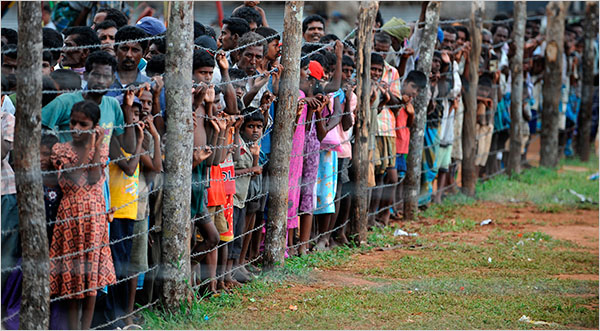
MANIK FARM, Sri Lanka (AP) � Lakshmi Rasamy reached through the
barbed wire enclosing this displacement camp, grabbed her mother's
hand and wept for her four children who were killed in the last
spasm of fighting in Sri Lanka's civil war.
Around her, other camp residents searched the crowd outside for
their loved ones and spoke of families split apart by the chaos, of
sons detained by the military, of illness, injury and death.
While Sri Lanka celebrates its military victory over the Tamil Tiger
rebels after a quarter-century of warfare, nearly 300,000 ethnic
Tamils who were driven from their homes and trapped in the war zone
are struggling to come to terms with the scars of the fighting.
Most of them have been corralled into Manik Farm, a 1,400-acre
(570-hectare) lot of former scrubland that has been turned into what
the U.N. describes as the world's largest displacement camp, housing
210,000 people in endless rows of white tents.
Like dozens of other smaller camps in the north, Manik Farm is
surrounded by coils of razor wire and rows of barbed wire. Those
inside are barred from leaving, a restriction that has generated
strong criticism from international rights groups who say the
displaced should be free to choose where they want to live.
"We are holding them here for their own safety," military spokesman
Brig. Udaya Nanayakkara said during a military-led tour of the camp
Tuesday. "We don't want anyone to come here and set off a bomb."
Other officials say the war refugees must be screened to weed out
any remaining rebels from the Liberation Tigers of Tamil Eelam who
may be hiding among them.
But the restrictions have also kept families apart and left the
barbed wire fence as the only link between those inside the camps
and their relatives who lived outside the war zone.
Rasamy, 45, sat in the dirt with tears pouring down her cheeks as
she held hands through the rows of barbed wire with her mother
outside the fence. She told her of the final days of the war, her
escape from the battle zone five days ago and the death of four of
her five children in the violence.
A nun, who gave her name as Sister Madeleine, had received a note
that her sister's family was in the camp and came here in hopes of
seeing them for the first time in two years. But after five hours
and repeated announcements over a camp loudspeaker, she was still
waiting.
Nearby, Veluppilla Selvaraj, 39, scanned the crowd for his mother
and sister. He was given emergency leave from his job as a security
guard in Saudi Arabia to try to find them. "I was here yesterday and
the day before and the day before. I am still searching," he said.
Many in the camp said they lost their families in the chaos and
violence of the final days of the war and their flight across the
front lines. Some held formal family photos taken at wedding
celebrations, pointing to those relatives that were missing.
One man said he got separated from his wife and two children last
month as they fled the approaching fighting. He doesn't know whether
they are alive or dead. Another woman said she thinks her 7-year-old
son is with his grandmother in another camp, but she isn't certain.
A mother said her 2-year-old son was shot in the head while they
were fleeing the unrelenting shelling and gunfire in the war zone
two weeks ago. When she reached Sri Lankan lines, she gave the child
to soldiers who promised to take him to the hospital. She's heard
nothing of him since.
On Tuesday, the U.N. high commissioner for human rights demanded an
independent investigation into atrocities committed in Sri Lanka's
civil war.
Navi Pillay recommended to the U.N. Human Rights Council that the
government and rebels be investigated for the tens of thousands of
civilians killed and wounded since December.
Sri Lankan Ambassador Dayan Jayatilleka said it was "outrageous" to
suggest the government should be investigated, saying it was like
asking the victorious allies of World War II to accept a war crimes
tribunal for the atomic bombing of Hiroshima.
A 29-year-old woman at the camp named Ranjini meanwhile said the
army had taken her husband as they escaped the conflict zone on
suspicion he was a rebel fighter.
Military officials said they had pulled out 9,100 suspected rebels
and sent the bulk of them to rehabilitation camps.
Some of the displaced said the military is suspicious of everyone.
"Most of the Tamils they are calling LTTE," said a man who
identified himself as Seevalingam, a former worker at the hospital
at Kilinochchi, once the rebel's administrative capital.
Though the government has said it hopes to resettle the bulk of the
displaced by the end of the year, Seevalingam said he feared they
would be stuck in the misery of this crowded mini-city for a long
time.
Nearby, two dozen people line up with pails and empty bottles to
pump water from a well alongside the white tents, which house as
many as 15 people each. Hundreds of others � many of them mothers
holding small children � waited for a ration of soap, baby formula
and aspirin. Others washed their toddlers in plastic basins.
Satgunanathan, who like many Tamils uses one name, said that in the
final days of the war there was massive shelling from both sides and
nowhere was safe. He bears shrapnel wounds in his head and one leg
from a shell that landed outside his family's shelter.
He complained about conditions in the camp, said his wife and two
children were in the hospital with diarrhea and expressed fears
about the heavy military presence here.
"Everybody is in misery here. We want to go back to our own homes,"
he said.
Associated Press writer Frank Jordans in Geneva contributed to this
report.